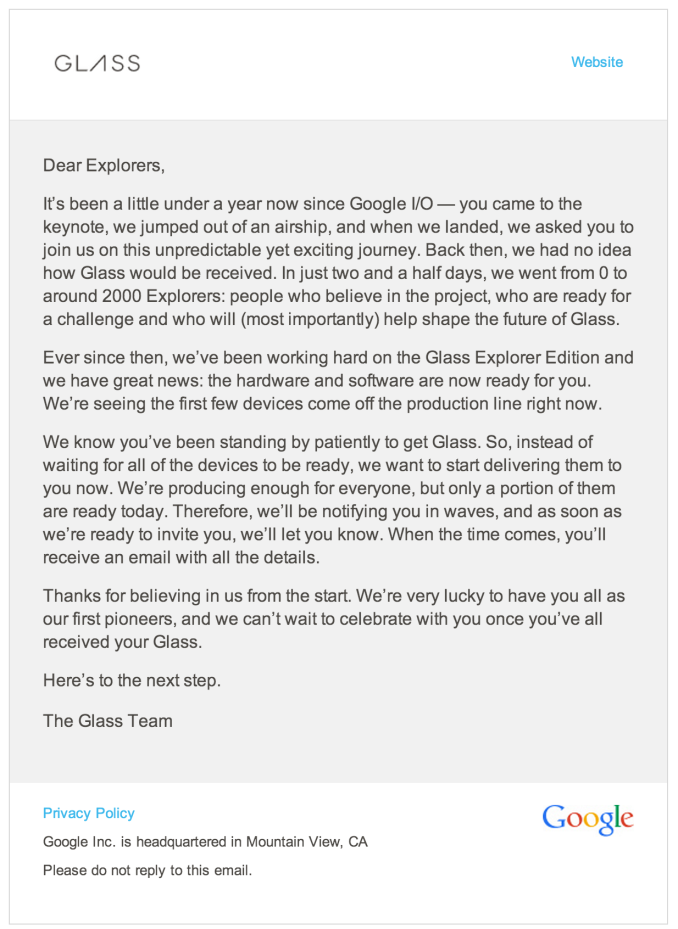Google Announces Glass Specs, Developer SDK, Shipment to Glass Explorers in Waves
by Brian Klug on April 16, 2013 12:06 AM EST- Posted in
- Smartphones
- Android
- Google IO
- Mobile
- Android 4.0
- Google Glass

Google dropped a bunch of Glass related news today. First up are some high level specifications which posted in an FAQ document. There's still no word about SoC or platform beyond the rumors we've heard in the past that Glass is like a WiFi-only Galaxy Nexus. This is the first time we've seen official disclosure of some level of specifications however. From the spec page we get the following, which I've put in a table.
| Google Glass Specs | ||||
| Google Glass | ||||
| SoC | Unknown | |||
| Display | 640x360 "Equivalent of a 25 inch high definition screen from eight feet away" | |||
| Camera | 5 MP forward facing, with 720p video | |||
| Audio | Bone Conduction Transducer | |||
| Connectivity | 802.11b/g WiFi, Bluetooth | |||
| Storage | 16 GB NAND total, 12 GB free | |||
| Battery | Unknown mAh, "1 full day of typical use" | |||
| I/O | microUSB | |||
| Requirements | Android 4.0.3 or Higher with My Glass app | |||
Google is very light on detail here, and doesn't give resolution directly although it's obvious looking at the UI Guidelines from the SDK that 640x360 is the native resolution of the projection system. There's no explicit callout of what SoC is inside (although OMAP4 continues to be a persistent rumor) or battery size in milliamp hours or watt-hours. In addition we see the inclusion of 802.11b/g and no 802.11n, which is a bit curious, although I suspect most of the time Google Glass will be tethered to a smartphone over Bluetooth for connectivity with the companion application. Google also released the Mirror API documentation and a few sample applications alongside.
The other news is the first official communication of something along the lines of a delivery date for Glass Explorers. In an email sent out today, Google announced that the first Google Glass Explorer models are rolling off production lines and will begin shipping to explorers in waves. I committed myself to getting a Google Glass Explorer at Google I/O 2012 and eagerly await getting hands on time with the $1,500 wearable device.
Source: Google Mirror API, Glass UI Guidelines, Glass Tech Specs











19 Comments
View All Comments
Paulman - Tuesday, April 16, 2013 - link
"Bone Conduction Transducer" - wow, I wonder if it's going to sound like the sound is coming from inside your head!I hope this takes off, if only because I think the second generation tech of this could be truly remarkable (the iPhone to iPhone 3G leap comes to mind).
tipoo - Tuesday, April 16, 2013 - link
Other way around, it helps detect and isolate your voice. Like the Jawbone.A5 - Tuesday, April 16, 2013 - link
The tech can be used to receive audio as well.designerfx - Tuesday, April 16, 2013 - link
or in the TLDR form: speakers are easily microphones as well.MikeMago - Tuesday, April 16, 2013 - link
Love my job, since I've been bringing in $5600… I sit at home, music playing while I work in front of my new iMac that I got now that I'm making it online.(Click Home information)http://goo.gl/myhf7
msbpodcast - Wednesday, April 17, 2013 - link
SPAM Take this off or make the spammer pay.nevertell - Tuesday, April 16, 2013 - link
Wouldn't it make more sense to make it a bluetooth accessory to android devices, rather than having it as a standalone computational device?Brian Klug - Tuesday, April 16, 2013 - link
That's essentially their usage model, hence the implicit requirement that you have an Android device with Bluetooth. I'm sure it'll work standalone to some extent (they say a bluetooth enabled phone, I assume so it can tether) but ideally it needs that companion application.-Brian
nevertell - Tuesday, April 16, 2013 - link
Do you have any information on the software side of things ? Specifically whether or not it will be "open" for people to run their own software on it ? And I don't mean running specialized android apps.And if it is just a bluetooth projector and microphone hidden away in a pair of glasses, why would it need an ARM core in it's SoC ?
A5 - Tuesday, April 16, 2013 - link
Well it looks like the MyGlass app can be used to upload new "timeline cards" as they get developed.As for replacing the OS on the glasses entirely, I don't know. I'm sure it will happen at some point, but that doesn't seem to be possible at the moment.